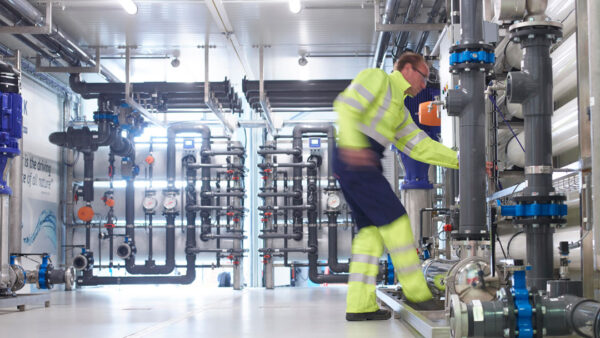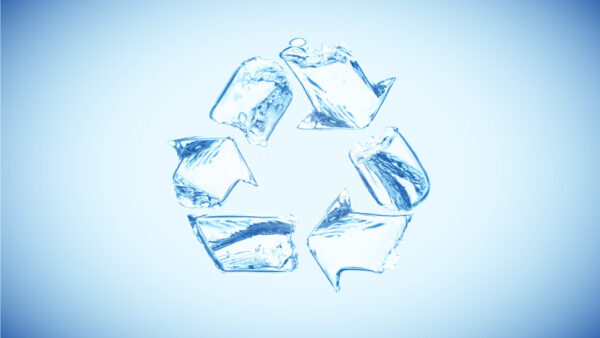The simplest description of what Ekopak does, is provide industry with sustainable water management. This provides companies with a changemaking solution to different issues they face. But how exactly? And what makes a decentralized source a better solution than any water saving project companies might already be implementing? Let’s get into it.
Companies carry a responsibility toward their stakeholders that includes minimizing their negative impact on the environment. Considering the ever more frequent periods of extreme drought and the enormous consequences that has on our society, a responsible attitude towards water usage is essential – especially if a company uses very large quantities of water and is largely dependent on the availability of this natural resource.
Many businesses are already aware they need a more conscious approach to their usage of water but have until now focused almost exclusively on projects to try and save water. And that is just not enough to truly deal with the layered issues they face concerning their water usage.
Companies might need water for a variety of reasons other than standard sanitary use, which is obviously already larger scale than that of a family’s household, for example. Additionally, factories or other industrial facilities might use a lot more water in their processes or as an ingredient in their product – and that is where their usage is the most important.
Because not only is this where they use the largest quantity of water, this is also where the water has the biggest impact on the business itself. A company could quite easily survive a short interruption in their sanitary water supply because their core activities don’t entirely depend on it. But if a company’s water supply for its processes is cut off, it can create a serious safety risk for its employees and the consumers of its final product.
Pieter Loose, CEO EkopakA decentralized water source enables businesses to disconnect from the regular water network and start a circular use.

A decentralized water source offers a more comprehensive solution than simply ‘saving water’, explains Ekopak CEO Pieter Loose: “It enables businesses to disconnect from the regular water network and start a circular use by revaluing and recycling the water.” In other words, instead of ‘wasting less water’, let’s not waste any water for industrial purposes at all by using a decentralized water source for an endlessly renewable supply. That not only allows companies to minimize their water footprint, but it also makes them much less vulnerable to water scarcity and the negative effects a water shortage and potential interruptions of their processes.
Smarter and more sustainable
“It is smarter, safer and more ecological to stop using and wasting drink water, and to switch to alternative sources such as wastewater, rainwater and surface water”, says Loose. “But of course, in making that switch, water treatment plays a crucial role.”
Aside from their need for water continuity, businesses are also dependent on the quality of the water. It’s important to note here that ‘quality’ here does not mean one general set of requirements that water has to meet: the characteristics that render water usable for one factory, might not make it usable for another facility.
Pieter Loose, CEO EkopakIf companies become self-reliant, that offers them the advantage of certainty.

“Our ambition is to convince all companies to disconnect from traditional water sources,” proclaims Loose. He’s not just speaking out of enthusiastic ambition for Ekopak’s growth, or not even for the preservation of our precious natural resources – it also genuinely makes the most sense for other business leaders.
By switching to a decentralized source, companies simultaneously guarantee the continuity of their own process water, and that of drinking water for the rest of society. It is not only the right thing to do, but also simply a matter of limiting business risks. When natural water reserves are exhausted, companies will certainly feel the negative economic impact of this. If companies become self-reliant, that offers them the advantage of certainty. That is why Pieter Loose can barely contain his excitement when he announces Ekopak’s ambitious dreams for the future: “We are convinced that by 2030 50% of companies in Belgium will no longer be connected to a traditional water source. By 2050 this will be the case throughout Europe.”
Our business units
For managing its performance Ekopak has adopted two business units, corresponding with an equal number of reporting segments: WaaS and non-WaaS – with WaaS being the acronym for Water-as-a-Service.



Non-WaaS Business Model
In the non-WaaS business model, Ekopak focuses on designing and building water purification installations at the customer’s premises, with the option to also cover the related servicing once the installation becomes operational. In this business model, the main part of the revenue recognition consists of the sales of the water purification installations to the customer, complemented by consultancy services, after-sales services and consumables supplies. The non-WaaS business is characterised by high operating income levels (inherent to the sale of these investment goods), combined with single to low-double digit EBTIDA-margins, depending on the mix between sales of consultancy services, investment goods, consumables,…
WaaS Business Model
The WaaS business model combines Ekopak’s design, build, finance, operation and maintenance services in a one-stop-shop, end-to-end solution with pay-by-the-drop pricing. Each WaaS agreement generates revenues in the form of a contractually agreed minimum monthly fee over the term of the contract, as from the first m³ of water supplied. Ekopak aims for an initial contract term of 10 years, with fixed €/m³ prices. Inherent to the WaaS business model is the fact that operating income is spread over the total lifetime (target: 10 years) of each agreement. Whereas a comparable non-WaaS contract largely results in a one-off revenue, a typical 10 year WaaS-contract secures 120 monthly revenues. As such, the WaaS business generates a lower revenue level at the time that the water purification installation becomes operational, but this is secured for the entire duration of the contract. Moreover, the WaaS business generates EBITDA-margins of at least 67%.
Activity


Focus Markets

Products &
Services

Our
Partners


